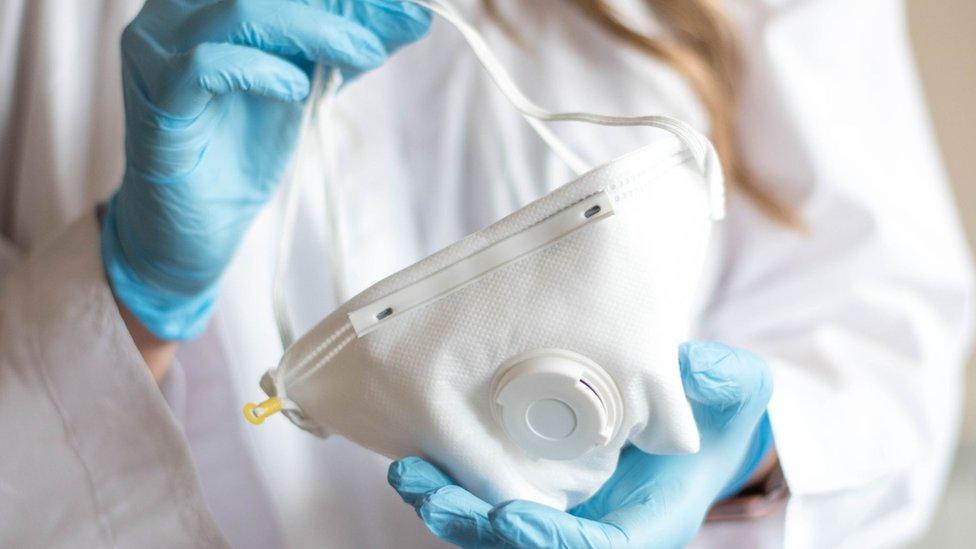Irish citizen questioned over €15m mask scam
- Published

There has been a worldwide shortage of face masks since the beginning of the Covid-19 outbreak
An Irish citizen has been questioned and bank funds have been frozen in an international investigation into a multi-million euro coronavirus mask scam.
The alleged scam began after a German company tried to buy 10m masks, valued at about €15m (£13m), from online suppliers.
The German buyer unwittingly placed an online order on a fake Dutch website.
Fraudsters put the buyer in touch with an Irish "intermediary", police say.
The German firm then made a down payment of €1.5m into an Irish company’s bank account, based in County Roscommon, for masks that were not delivered.

A SIMPLE GUIDE: How do I protect myself?
AVOIDING CONTACT: The rules on self-isolation and exercise
WHAT WE DON'T KNOW How to understand the death toll
TESTING: Can I get tested for coronavirus?
LOOK-UP TOOL: Check cases in your area

An international investigation is now under way involving Interpol as well as police forces in Ireland, the Netherlands and Germany.
Gardaí (Irish police) have since worked with banking authorities to freeze the funds in the Roscommon bank account.
They also interviewed an Irish citizen in Roscommon last Friday in relation to suspected money laundering, but the individual was not arrested.
The person was questioned by detectives from the Garda National Economic Crime Bureau (GNECB), with assistance from local officers.
A number of electronic devices and documents are currently being examined forensically as part of the investigation.
Irish broadcaster RTÉ has reported that the interviewee was a 48-year-old man from the west of Ireland, but police would not confirm this.
In a statement, Gardaí said the fake Dutch website had been cloned from the website of a legitimate firm based in Holland, without the real company's knowledge.
The German buyers reached "contractual agreement" with suppliers based in Holland and Ireland, and paid €880,000 into the Dutch fraudsters' account at the same time as they paid €1.5m into the Irish account.
According to Gardaí, representatives from the German and Irish companies met in Amsterdam on 27 March to oversee the handover of the masks, but the shipment did not arrive.
The German buyers then contacted the offices of the Dutch firm they believed they had ordered the masks from, and were told no order had been placed.
The authorities in Holland managed to recover the €880,000 which had been transferred by the German firm into a Dutch account.
They also arrested two men on suspicion of fraud and money laundering in connection with the €880,000 transfer, and the pair appeared in a Dutch court on 9 April.
However, a further €125,000 (£109,000) was paid into another account in Holland as part of the scam.
The masks scam also involves bank accounts in the UK and Nigeria, said Irish police.
They said €498,000 was transferred to a British bank account and then onward to Nigerian account, but this too had been recovered as a result of the international investigation.
There has been a worldwide shortage of face masks since the beginning of the Covid-19 outbreak and many countries have been unable to provide healthcare staff with sufficient personal protection.